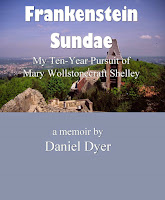An observation I will insert somewhere later.
November 16, 2016—to insert somewhere later on
This reminds you
of that. Not all that profound an observation, I realize, but I’ve noticed over
my years of writing about various literary figures—Jack London, Shakespeare,
Poe, and now Mary Shelley—that when I’m pretty well submerged in the seas of
their lives, all the marine creatures that swim into my view when I’m doing other things (reading a newspaper, a
detective novel; seeing a film; just randomly ruminating), these creatures
somehow metamorphose into something that reminds me of … London, Shakespeare,
Poe, Shelley, et al.
This morning, for
example, I was reading a Colson Whitehead novel (Zone One, 2011). I love Whitehead’s work, but I’d somehow let this
one slip by me—or, rather, let it slip down in my pile of things I want to read
until I’d pretty much forgotten about it. But after I read his latest novel (The Underground
Railroad, 2016), I remembered the forgotten one, extracted it from the
Tower-of-Pisan pile in our family room and started to read it.
It’s the ultimate
post-apocalypse, zombie novel. Literate, funny, horrifying, illuminating—even
dazzling at times. It’s about a guy—known to his teammates as “Mark Spitz”
(because he can’t swim)—who’s part of a group of “sweepers” who are dispensing
with the “skels” who remain after the plague has devastated humanity. The skels
eat people. Better to, you know, kill them
first. The sweepers leave the bodies for other crews to pick up and incinerate.
Well, today, I was
reading about the device they employed to incinerate the remains of the skels:
Here, it burned the bodies of the dead with uncanny
efficiency, swallowing what the soldiers fed into it and converting it to
smoke, fly ash, and a shovelful of hard material too stubborn to be entirely
consumed. Hearts, mostly. That thick muscle (187).
And, of course,
reading, I immediately remember that day in August 1822. On the beach near
Viareggio, Italy. The cremation of the drowned Bysshe Shelley on August 15. And
how his heart had refused to burn thoroughly. And how his friend Trelawny had
snatched the heart from the fire (burning his hand in the process). And how the
Shelleys’ friend Leigh Hunt claimed the heart. (Mary was not present.) About
how Mary, learning of the heart’s existence, asked Hunt to give it to her.
About how he refused. About how Mary got Lord Byron to intervene. About how
Mary kept that heart the rest of her life. About how her son, Percy Florence
Shelley, discovered it after her death with his poem “Adonais.” About how he
arranged to have it buried with her in Bournemouth. About how I stood at the
Shelleys’ tomb in 1999. And thought about all of this.


No comments:
Post a Comment